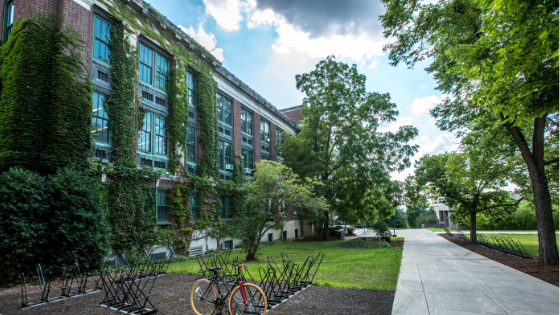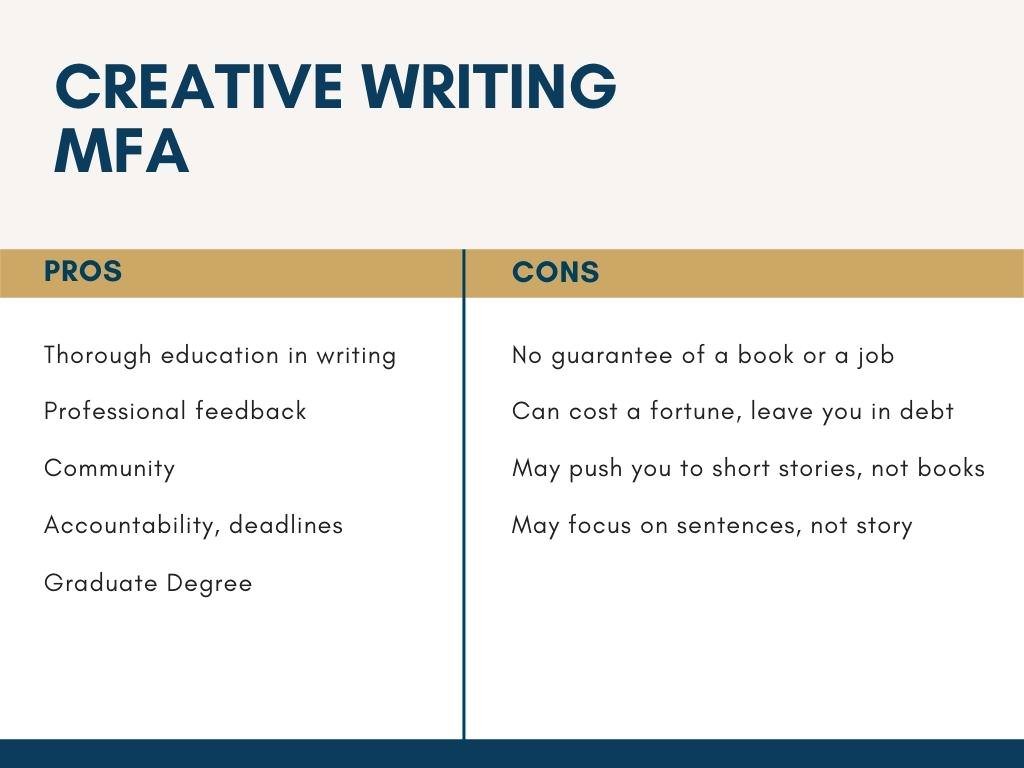Is an MFA in Creative Writing Worth It?
Should you get an MFA in creative writing?
Maybe.
If you're hoping for an easy answer, you’re not gonna get it from me.
I think their value depends entirely on a student’s unique circumstances. Personally, I’m incredibly satisfied with the experience I had at UC Riverside. At the same time, I know people who have not been happy with their experience but have still spent years saddled with student loans.
Personally, I learned how to read more critically, experiment with story and language, understand craft more deeply, navigate the publishing industry, and most importantly, I got expert feedback on my work.
I wholeheartedly recommend an MFA, but I also feel sick to my stomach at the thought of you wasting all of that time and money if it’s not what you really need.
Instead of a yes or no, I want to:
The Top Pros and Cons of an MFA
PROS
You’ll get a thorough education in writing, read more widely, learn new techniques and definitely improve your craft.
Professional feedback, which is invaluable to your growth as a writer.
Community. That might be the best thing I got from my MFA because it keeps on giving, long after graduation.
Accountability through assignments. There is nothing like a deadline to make you write, especially if you’re paying an arm and a leg for it!
CONS
There are no guarantees it will help you get a book deal or a teaching job. In fact, it’s unlikely you will get either.
It will probably cost you a ton of money. (If you get an offer for full funding, disregard entirely…you should probably jump on that!)
There may be a focus on finely crafted sentences at the expense of storytelling and overall structure.
If you don’t pick the right program, you could be pushed into short stories instead of novels or a style or genre that is wrong for you.
How I suggest you decide if an MFA is worth it to you
Carefully weigh the cost
While these programs are said to fully fund all of their students, most of the time, you’ll have to fork out some serious cash, ranging roughly between $20,000 to $80,000.
A Facebook friend recently asked other writers how much their MFA student loans came to, and dozens of people who went to private schools said they were sitting on loans in the $250,000 range! It’s hard to imagine that kind of investment will ever pay off. Also, that money can buy you a lot of editing, one-on-one coaching, and time.
Know that an MFA is not an MBA
It will not immediately earn you more money or job opportunity. In fact, go ahead and assume you will not get this money back either through a book advance or teaching job.
A typical advance wouldn’t recoup the cost of your education, and as you know, it’s extraordinarily competitive to get a traditional book deal. Even harder is landing a tenured, college-level teaching job. Can you still afford to spend that kind of dough?
Screw “time to write”
Unless you’re in a fully funded program, you’d better be getting a hell of a lot more than time. If that’s all you expect, take your money and live off of it for as long as you can and write all day.
I’m not sure how the phrase “time to write” got popularized, but when I was considering an MFA, many grads from prestigious schools told me that’s all an MFA was good for. With that thinking, I couldn’t afford it. I’d still be miffed about taking out student loans if I’d gotten anything less than I did — mentorship, community, instruction, support, fun, friendship, accountability, and a pretty balanced mix of enthusiasm and reality check.
If the school is going to pay you to study and your family is onboard with the time commitment, then time to write would be glorious! I’ll take some of that please! Keep in mind that it’s mostly traditional brick-and-mortar schools that provide funding, not low-residency or online programs.
For my family, brick-and-mortar was out of the question, so I had to weigh my investment extremely carefully.
Make sure you’re ready
If you aren’t entirely sure you can handle the work load, confident you can take sometimes harsh feedback, willing to experiment, and ready to dig deep to improve your writing, you’re wasting your time.
If you’re ready for all of that, and you pick the right program (more on that in a sec), it’s hard to imagine you won’t improve your game by a trillion points or more.
Whatever you do, do not fork over tens of thousands of dollars if what you want is a pat on the back. You will leave bitter and broke.
Pick the right MFA program, not the best MFA program
If you want to write commercial fiction, don’t choose a deeply academic program that calls anyone who publishes a sell-out.
Similarly, if you want to write novels, don’t choose a program that will push you into short stories because they’re more literary or easier to workshop.
I know someone who went to a prestigious, fully funded program only to transfer to a low-res school that would “let” her write a novel.
If you know you want to teach, look for a school that will let you teach, TA, or even better, one that also teaches teaching. Many do not.
Also, if you have a unique interest, look around for specialty programs.
Examples of specialized programs or concentrations:
Chatham University offers specialties in food writing, travel, nature, and social engagement
Savannah College of Art and Design focuses on non-fiction.
UC Riverside's low-res program, UCLA, Boston University, and Goddard College offer concentrations in screenwriting and playwriting.
The New School and Vermont College of Fine Arts have concentrations in writing for children and young adults.
The Vermont College of Fine Arts also offers a separate low-res international MFA program with residencies all over the world (sounds amazing to me!) and a track for literary translation. (UPDATE: This has closed, but here’s to hoping it reopens when the pandemic is far enough behind us.
Whether you’re a screenwriter, poet, essayist, librettist, environmentalist or probably anything else, there is a program for you.
Next Steps
Ready to apply? Here are some resources to help with your application.
To learn about various programs, check out more than 220 of them at Poets and Writers.
For tips on affording the experience, visit affordingthemfa.com.
Some of my favorite advice for writing killer applications comes from people who screen applications. Eileen Pollack, who has been reading MFA applications for 25 years, offers a thorough and helpful take here, and Kendra Fortmeyer also offers some great perspective here.
You might consider getting one-on-one help from an MFA application reviewer. There are lots of people out there who will help you revise and fine-tune your application.
(I can personally recommend Diana Goetsch. When I was applying for a fellowship, her feedback was astoundingly brilliant.)
3 Tips for Settling on the Right Program
Once you determine your goals and narrow down programs that might fit, look up their graduates. What jobs and publications do they have five years later? Do those line up with your own expectations?
Next, talk to current and/or former students. The schools should be able to get you on the phone with someone willing to talk about their experience.
Lastly, once you’ve been accepted, see if you can sit in on a workshop before you decide.
Not sure about the investment? Here are some alternatives:
CONFERENCES
Conferences can give you energy and inspiration along with an introduction to the publishing industry. They’re also a great place to start building community. You’ll find a conference for every type of writing, at every level, and in almost any location. Although many of them are on hiatus or only virtual right now, start looking for the ones you might attend when it’s safe.
The Write Life has a list of 60 writing conferences.
Writer’s Digest also has some useful tips for how to make the most of any writing conference.
COMMUNITY CLASSES
Running from one afternoon to an entire year, community classes are a less formal alternative to an MFA. They’re generally more affordable and require less commitment (good or bad thing?), plus you can usually start any time.
Look for university extension programs (UCLA’s is stellar and so is Arizona State’s) or local writing centers like The Writer’s Center in DC, Lighthouse Writers Workshop in Denver, The Loft in Minneapolis, Grub Street in Boston, Sackett Street Writers Workshop in Brooklyn, or Story Studio in Chicago.
Chances are you have something near you.
CRITIQUE AND ACCOUNTABILITY GROUPS
If you can find like-minded writer friends to swap stories with and work toward the finish line with, you’ve struck gold. These relationships can last years or decades and be more fun and informal than classes. Search for one online or start your own.
COACHES, EDITORS, AND CONSULTANTS
I’m a little biased here, but I think one-on-one instruction, feedback, and support can be one of the best ways to reach your writing goals
You can also work one day, month, or project at a time and expect a totally customized approach.
Good luck with this decision! It's a big one.
Keep Reading













